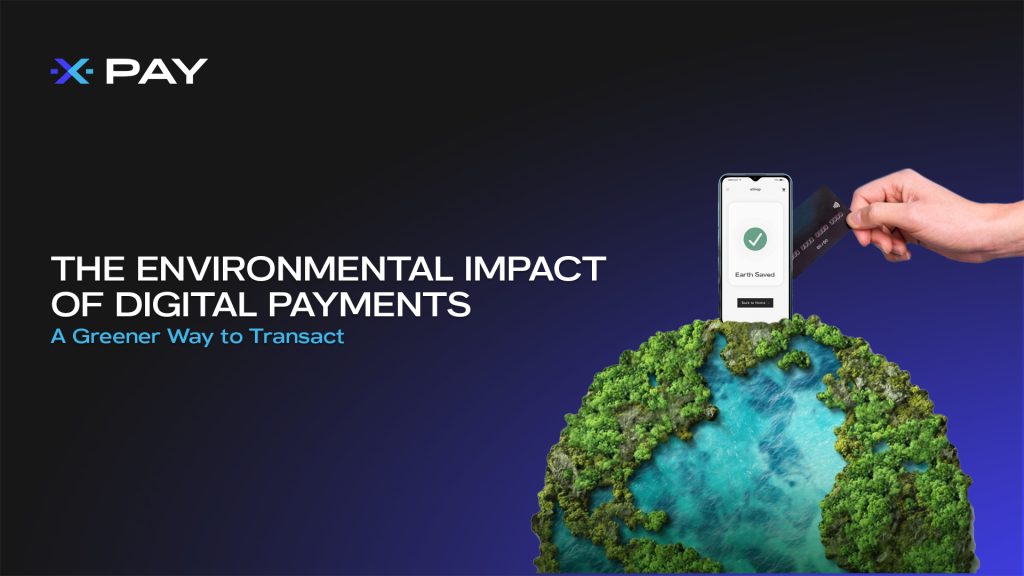A Greener Way to Transact
As businesses and consumers embrace digital transformation, the shift toward cashless transactions isn’t just about speed and convenience—it’s also a significant step toward sustainability. Traditional payment methods, like cash and paper-based transactions, have long contributed to waste and carbon emissions, making digital payments a more environmentally friendly alternative.
By adopting contactless and digital payment solutions, businesses can reduce their ecological footprint while providing customers with a seamless and modern payment experience. Here’s how XPay is leading the way in green transactions and how your business can benefit from adopting digital payment solutions.
Reducing Paper Waste and the Carbon Footprint of Cash Transactions
Paper Waste in Traditional Payments
Traditional payments rely heavily on paper-based receipts, invoices, and physical currency. According to the U.S. Environmental Protection Agency (EPA), paper waste accounts for around 26% of landfill waste globally. The lifecycle of cash—from printing banknotes to ATM withdrawals—requires large amounts of water, energy, and raw materials, contributing to deforestation and environmental degradation.
Energy Consumption of Physical Currency
The minting of coins and printing of banknotes is an energy-intensive process. A study by the Bank of Canada found that producing and transporting cash generates a significant carbon footprint, with transportation emissions accounting for 92% of the total environmental impact of cash payments.
How Digital Payments Reduce These Issues
By adopting digital payment solutions such as mobile wallets, online banking, and contactless payments, businesses and consumers can significantly cut down on paper waste and reduce emissions associated with physical cash handling.
- Contactless transactions eliminate the need for paper receipts.
- Mobile payments reduce the demand for printed invoices and checks.
- Digital banking minimizes the carbon footprint linked to ATM withdrawals and cash transportation.
The Environmental Benefits of Using Mobile Wallets and Digital Banking
Mobile Wallets: A Paperless Solution
Mobile wallets, such as FawryPay or Apple Pay, provide consumers with secure, instant transactions without relying on physical cards or cash. A report by Capgemini highlights that mobile payments have the potential to reduce paper waste by 85% in retail transactions.
Digital Banking and Paperless Transactions
Digital banking platforms have eliminated the need for printed bank statements, checks, and deposit slips, reducing both paper consumption and transportation emissions. Research by Statista estimates that digital banking adoption could prevent 500,000 tons of paper waste annually.
Energy-Efficient Payment Systems
Unlike cash-based transactions, which require ATMs, physical security, and transportation, digital payments are processed via cloud-based infrastructure, which has lower energy consumption and fewer emissions. A World Bank report indicates that digital payments require 70% less energy than traditional payment systems.
How Businesses Can Promote Eco-Friendly Payment Methods
Encouraging Mobile Payments Over Cash
Businesses can incentivize customers to switch to mobile payments by offering discounts or loyalty points for choosing digital transactions. According to McKinsey & Company, businesses that promote cashless payments reduce their operational costs by 20% while lowering their environmental impact.
Digital-Only Receipts
Switching to digital receipts can significantly reduce paper waste. A study by Green America found that receipts printed in the U.S. alone consume over 3 million trees per year.
Promote Card Payments Over Paper-Based Methods
Encouraging customers to use contactless cards or mobile wallets instead of cash helps reduce the energy and materials needed for printing physical money. According to Visa’s Environmental Impact Report, digital transactions have a 50% lower carbon footprint than cash transactions.
Partnering with Eco-Conscious Payment Providers
Businesses can work with fintech companies that prioritize sustainability—like XPay, which offers contactless, paperless payment solutions that support a greener economy.
How XPay is Contributing to Green Transactions
At XPay, we are not only committed to secure and innovative payment solutions but also to reducing environmental impact through digital-first, paperless transactions. Our platform provides businesses with eco-friendly payment solutions that help reduce waste, carbon emissions, and reliance on physical infrastructure.
XPay’s Sustainable Payment Solutions/Features
- No Code Payments – A seamless, paperless checkout experience directly on websites or apps, eliminating printed invoices and receipts. This solution not only enhances the customer experience but also significantly reduces paper waste.
- Payment Links Integration – Allows businesses to send secure digital payment links via email or SMS, eliminating the need for paper invoices and receipts. This feature supports a paperless, eco-friendly approach to payments while ensuring security and convenience.
- Instant Payment Links – Provides custom online payment links for one-time or recurring transactions. By removing the need for cash handling or printed bills, it supports a fully digital, environmentally conscious transaction flow.
- Payment Gateway Integration – Automates orders and payments directly within business systems, reducing reliance on printed forms and receipts. This integration not only streamlines operations but also supports sustainable practices by minimizing paper usage.
- SMS Reminders – Automate payment reminders through SMS, reducing late payments and saving time spent chasing clients. This helps businesses stay efficient and ensures smoother cash flow while maintaining eco-friendly practices.
- Soft QR Code – Generate dynamic soft QR codes for instant in-person or online payments, reducing the need for physical receipts or invoices. This touch-free solution aligns with both convenience and sustainability.
- Variable Payment Links – Customize payment links to accept variable amounts from customers, offering flexibility and ensuring a smooth, paperless transaction experience.
With these solutions, businesses reduce waste, lower operational costs, and provide customers with a seamless, paper-free payment experience—all while contributing to a greener future. Learn more about XPay’s eco-friendly payment solutions
A Sustainable Future for Payments
Long-Term Environmental Benefits
The shift toward digital payments offers long-term environmental benefits, including:
- Less paper waste from receipts, invoices, and checks.
- Lower energy consumption than cash-based systems.
- Reduced reliance on physical banking infrastructure.
Why Sustainability Matters for Businesses
Consumers are increasingly looking for brands that prioritize sustainability. According to IBM’s Global Sustainability Study, 70% of consumers prefer businesses that adopt eco-friendly solutions. By adopting digital payments, businesses can:
- Attract eco-conscious customers
- Reduce operational costs
- Support global sustainability efforts
Make the Switch Today
It’s time for businesses to embrace digital payment solutions that support both economic growth and environmental responsibility. By choosing XPay, businesses can:
- Offer fast, secure, and paperless payment experiences.
- Reduce waste and carbon footprints.
- Lead the way in sustainable transactions.






